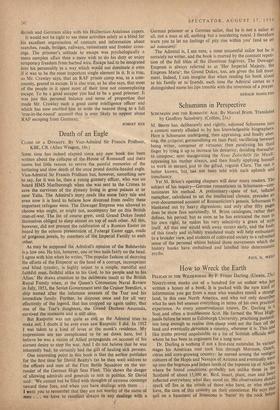Schumann in Perspective
SCHUMANN AND THE ROMANTIC AGE. By Marcel Brion. Translated by Geoffrey Sainsbury. (Collins, 21s.)
M. BRION has, deliberately and rightly, adjusted Schumann into a context merely alluded to by less knowledgeable biographers. Here is Schumann undergoing, then appraising, and finally abet- ting, the zeitgeist; gormandising on Jean Paul; vacillating between being writer, composer or virtuoso; then paralysing his third finger by tying it up to increase his dexterity; deciding thereafter to compose; next inaugurating the Nerve Zeitschrift ffir Mu.sik; appeasing his mother always, and then finally applying himself to work in earnest and to the gifted, roguish Clara. The rest is better known, but has not been told with such aplomb and trenchancy. Yet M. Brion's opening chapters will deter many readers. The subject of his inquiry—German romanticism in Schumann—con- taminates his method. A preliminary .spate of hot, inflated metaphor, calculated to set the intellectual climate, precedes an over-documented account of Romanticism's genesis. Schumann is blanketed out by heavy digressions; and only after fifty pages does he show face sustainedly. M. Brion catalogues, rather than defines, his period; but as soon as he has extricated the man in his own righi, he makes his very selectivity a grace of style itself. All that one would wish away occurs early, and the body of this timely and stylishly translated study will help enthusiasts to a broader view, and students of cultivated society to a refreshed sense of the personal whims behind those movements which the history books have embalmed and labelled into deterministic myths. PAUL N. WEST.


































 Previous page
Previous page